Vitaly Paley
Vitaly Paley immigrated to the United States from the Soviet Union in 1976. He and his mother settled in New York, but in 1994 he moved to Portland, OR, where he became a chef and owner of two successful restaurants and one diner.
Vitaly Paley was born in 1963 in Gomel, Belarus, which was part of the Soviet Union. While his mother, Genya Paley, studied piano at a music conservatory in Minsk, he was raised primarily by his maternal grandparents, Rosa and Mikhail Lifshitz, in a rural one room home, with his mother visiting at every opportunity. This proved to be a happy time in Paley’s childhood, as he was doted upon by both of his grandparents. His grandfather, a skillful craftsman, created toys for Vitaly and was his playmate. His grandmother, a talented cook in her own right, prepared wonderful dishes using the ingredients from her garden, as well as the produce from the local market. At the age of seven, Paley moved into a two-bedroom apartment on the fourth floor of a state-approved apartment building near the airport, with his mother, father, and grandparents. Located on 32 Kojara Street, this building followed the architecture typical of the Soviet Era — plain but functional, with shared amenities, such as a ping-pong table. In contrast to his previous home, this building provided Paley with the opportunity to socialize with children who also resided in the building.
After the passing of his grandparents, Paley’s mother made the decision to emigrate with her son from the Soviet Union. One of the motivating factors in this decision was to prevent him from having to serve in the Soviet army, which had a conscription age of 18. This decision meant not only leaving behind their homeland, but also facing a public backlash. For example, Vitaly Paley was publicly stripped of his young pioneer necktie, as a symbolic gesture that he and his family had betrayed their country by starting the immigration process. Additionally, Paley’s father decided to remain in Belarus, as he grappled with the decision to leave behind his mother and siblings, unsure of whether he would see them again. About two years after their departure, Paley’s father joined his wife and child in America.
Paley and his mother emigrated from the USSR on November 18, 1976. Their immigration followed the trajectory of many Russian-speaking Jews in the 1970s. The process of relocation was first aided by HIAS, the international immigration and resettlement organization. They first traveled to Austria and stayed there for 2-3 weeks. Next, they migrated to Italy for 6 months, before finally arriving in New York City. Upon their arrival in the United States, Paley and his mother lived with relatives in Jackson Heights, a neighborhood in Queens, New York, in a Hasidic Orthodox community. These relatives had made the same journey several years prior, and were able to help Paley and his mother adapt to their new country. In addition to relatives, the Paleys were helped by the New York Association for New Americans (NYANA), which resettles refugees who have recently arrived in New York City. Paley’s mother continues to work for NYANA even today, as it provided her with support until she found her first piano instructor job.
Although he spoke little to no English, Paley’s transition into his life in the United States was fairly smooth. He learned the language in school as well as through popular 1970s television shows such as Star Trek. He even practiced speaking with an American accent, so that he could fully integrate himself into his surroundings, and not feel like a Russian immigrant outsider. Music also helped Paley to adapt to life in New York. Like his mother, Paley was an accomplished pianist, and at such a young age was considered a prodigy, having already graduated from music school in the USSR. After arriving in New York, Paley was enrolled at the Juilliard School, as well as the Professional Children’s School. This allowed Paley to simultaneously hone his musical talents as well as fulfill his academic requirements. Paley continued to attend Juilliard for his undergraduate studies.
After two years, Paley left Juilliard in order to explore his interests outside of music. In 1984 he found work serving tables at restaurants until he became the manager of a restaurant in 1990. It was then that he met his wife Kimberly, a dancer, who had also begun working in the culinary business after spending much of her life devoted to the performing arts. After marrying, Paley decided to attend the French Culinary Institute in order to expand his knowledge of the restaurant trade along with his culinary skills. At the institute, Paley discovered his passion for cooking. In 1992, after earning a Grand Diploma at the French Culinary Institute, Vitaly and Kimberly followed this passion to Limoges, France, where they worked at Moulin de la Gorce, a two-star Michelin restaurant. It was there that he was inspired to visit the Pacific Northwest, and Oregon specifically, when a superior batch of chanterelle mushrooms arrived at the institute. A roadtrip to the Pacific Northwest came later, when the Paleys were living in New York City. Because the roadtrip offered them the rugged landscape and fresh ingredients that they craved but couldn’t get in NYC, Paley and his wife moved to Oregon in 1994.
Since settling in Oregon, Vitaly and Kimberly Paley have opened three very successful culinary businesses in Portland – Paley’s Place Bistro & Bar, Imperial Restaurant, and The Portland Penny Diner. Among numerous honors, Paley became the recipient of the prestigious James Beard Foundation Award for “Best Chef: Northwest” in 2005. Additionally, he was nominated for the foundation’s “Semifinalist for Outstanding Chef” in both 2012 and 2013. In 2008, he and his wife published a celebrated cookbook entitled “The Paley’s Place Cookbook: Recipes and Stories from the Pacific Northwest,” which provides a glimpse into the bountiful food and wine market of the region. Additionally, Paley has created a line of organic energy bars, called “Handmade at Paley’s Fruit & Nut Bars,” that are sold in select locations nationwide. A proud and active member of the Portland community, Paley frequently participates in local and national charity events.
Recently, Paley has begun to explore Russian cuisine by creating a monthly five course pop-up menu, often putting his own twist on traditional dishes using regional flavors. This menu has provided him with the opportunity to explore his own heritage, as well as to do what he loves: introduce new flavors to the palates of his patrons. He even pays homage to his grandmother — a clear influence on his loving relationship with food and quality ingredients — by placing some of her recipes on this menu. The process of creating this menu has sparked Paley’s interest in traveling to his birthplace, which he had distanced himself from for so many years. So while the pop up menu series is a professional endeavor, it is also deeply personal.
This story is written by Elise Loughran and it is based on the interview Elise conducted with Vitaly Paley in Portland, OR, August 8, 2014
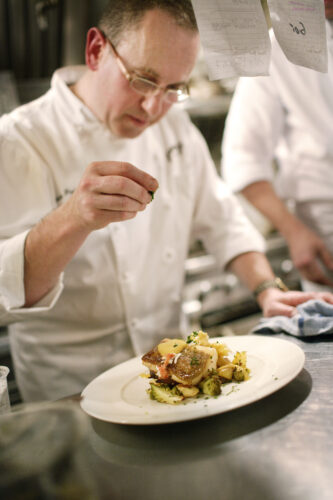
Plating food (cr. to J. Valls) 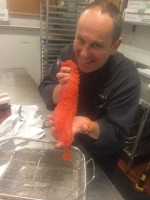
Making caviar 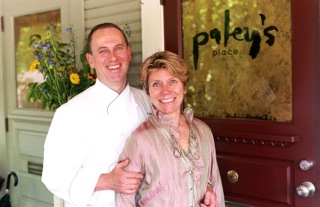
Vitaly with his wife Kimberly
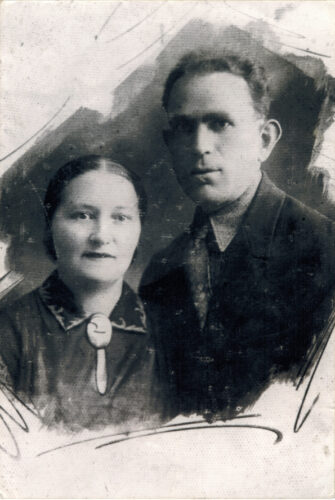
Vitaly’s grandparents, Rosa and Mikhail Lifshitz 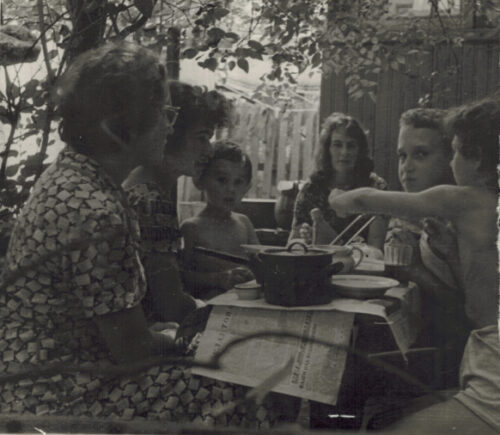
family gathering in Soviet Russia 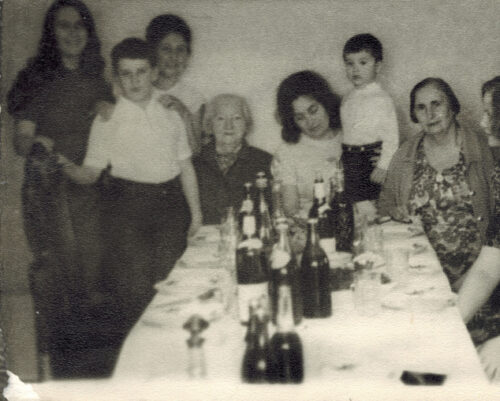
family gathering in Soviet Russia 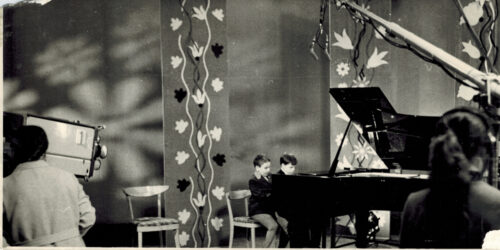
Vitaly playing piano as a child on Russian TV 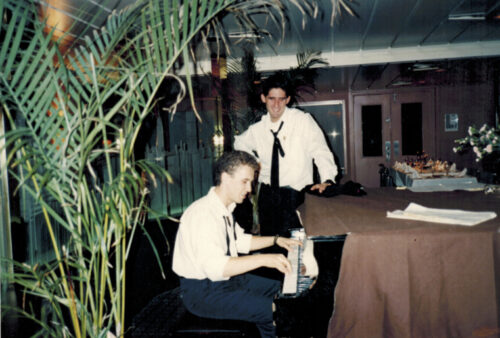
Vitaly playing piano in NY 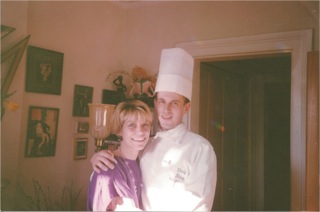
Graduating from the French Culinary Institute 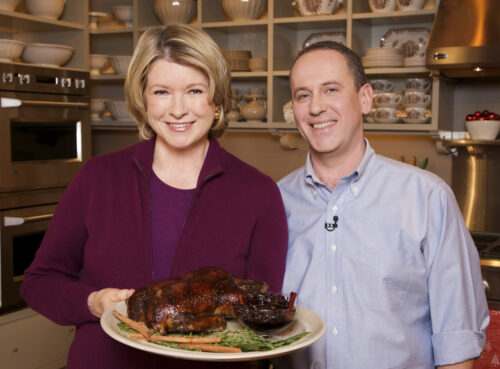
with Martha Stewart on her show 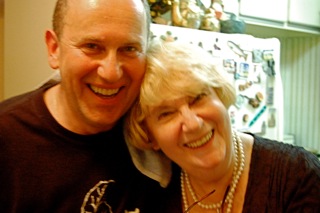
Vitaly with his mother
